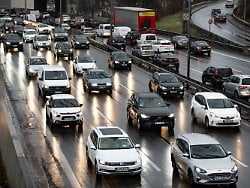“Would be the wrong signal”
Commuter allowance: criticism of Lindner’s initiative
2/9/2022 4:09 am
In view of the rise in energy prices, Federal Finance Minister Lindner is bringing an increase in the commuter allowance into play. In the SPD there seems to be a willingness to talk in this direction, but the Greens faction considers the proposal to be “unhelpful”. Even leading economists think little of the subsidies.
SPD parliamentary group leader Matthias Miersch has spoken out in favor of a targeted increase in the commuter allowance. “Many commuters in particular are also affected by rising fuel costs and cannot simply change trains, so I think it’s right to compensate for hardships in a targeted manner with the commuter flat rate,” said the environmental politician of the “Rheinische Post”. The development of energy prices must continue to be monitored. “However, we should not distribute the money with a watering can, but rather target it at people who are affected because of their income or other circumstances, such as commuters.”
Federal Finance Minister Christian Lindner had brought an adjustment to the commuter allowance into play. If there is an agreement “to do something about it, the finance minister would not fail,” said the FDP politician on the RTL Direkt program. “Because in fact, in the broad middle of society, people are affected by the rising energy costs.” The lump sum was only raised to 35 cents at the beginning of 2021 for distances of more than 21 kilometers.
Greens parliamentary group leader Lisa Paus warned: “To tinker around with the commuter allowance is not very helpful.” Aid is needed “that acts specifically where it is most needed and does not continue to fuel fossil fuel inflation”. The traffic light government is working on an overall package with relief, which, in addition to the heating cost subsidy for low earners, includes an immediate child allowance, the division of the CO2 price for heating costs between tenants and landlords and the fastest possible abolition of the EEG surcharge.
“Does not help the small purse”
The climate economist Ottmar Edenhofer criticized the plans for a possible increase. “The commuter allowance does not help the small purse, the research shows that clearly,” said the professor and director of the Potsdam Institute for Climate Research (PIK) of the “Neue Osnabrücker Zeitung”. In order to relieve low-income households, it would be better to “quickly get the climate money on the road now” as planned in the coalition agreement as social compensation for the CO2 price.
Lindner’s initiative met with little approval from other economists, too. “An increase in the commuter allowance would send the wrong signal and be economically counterproductive,” Marcel Fratzscher, President of the German Institute for Economic Research (DIW), told the Reuters news agency. “It would subsidize commuting by car even more than it already does, while people in the city would benefit less or not at all from heating costs, for example.” This would also benefit higher earners, while people with low incomes “would once again lose out”.
The Kiel Institute for the World Economy (IfW) comes to a similar assessment. “The commuter allowance is too crude an instrument that hardly helps the lower income groups, if at all, and is otherwise not very accurate,” said IfW Vice President Stefan Kooths. Higher gas prices would essentially affect heating costs, while users of local public transport are already benefiting from other subsidies. “Government subsidies are not paid for by a third party, they are paid for by taxpayers,” Kooths added.
